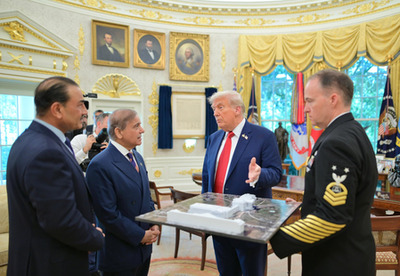London, Oct 31 (IANS) Reports claiming Pakistan's supposed deal with the United States (US) regarding the sale of rare earth minerals and potential access to Pasni port has sparked criticism from multiple quarters, including Pakistan Senate's former chairman Raza Rabbani, who has taken a firm stance against what he considers as the federal government's "secretive deal" for constitutional protocols.
A senior leader of Pakistan Peoples Party (PPP), Rabbani urged the Pakistan government to immediately brief parliament on what he describes as a "new US policy", a report has stated.
"His remarks came in response to growing speculation in the press regarding a possible agreement allowing a US company to acquire or manage Pakistan’s rare earth mineral resources. Adding fuel to the controversy are suggestions that the government may even be considering granting operational access to Pasni, a small but strategically vital port on Balochistan’s Makran coast, to Washington. For many observers, these reports echo Pakistan’s historical patterns of making strategic concessions to external powers in times of economic desperation, decisions later challenged as compromises on sovereignty," Sakariya Kareem wrote in UK-based newspaper for British Asians, Asian Lite.
PPP leader not only criticised the lack of information but also targetted the fundamental structure of decision-making in Pakistan. He accused the federal government of not following constitutional requirements, especially those mentioned in Article 172 of the Constitution.
"The article is explicit that the mineral resources within a province are jointly owned by the federal and provincial governments. Rabbani argued that this joint ownership gives the provinces the legal and moral right to be part of any discussion or decision concerning the exploration, sale, or lease of mineral resources," the report highlighted.
Raza Rabbani's statement showcases the tensions between Pakistan's federal and provincial governments, especially concerning resource control. Balochistan, which has reserves of lithium, gold, copper and othe critical minerals has for a long time accused Pakistan of exploitation and neglect. Despite being one of the most resource-rich province, Balochistan remains economically deprived region of Pakistan. According to the report, any decision about minerals that does not include Baloch representatives is considered locally as another act of central dominance. In his situation, Rabbani's remarks resonate with discontentment among residents of the province and fears of being sidelined once again.
"The federal government’s silence on the matter has only deepened public suspicion. Neither the Ministry of Commerce nor the Ministry of Energy has issued any clarification on whether discussions with the United States, or any particular US company, have advanced to the stage of a formal agreement. Meanwhile, government sources have argued that such strategic deals, especially those involving critical minerals essential to modern technologies, could provide Pakistan with much-needed foreign investment and technological expertise. Yet, the absence of transparency and inclusive consultation continues to overshadow any potential economic justification. Rabbani contends that development cannot come at the cost of constitutional process or public accountability," the report in Asian Lite stated.
"Rabbani made it clear that the question is not limited to foreign relations; it is about internal legitimacy. He reminded the government that the Council of Common Interests (CCI), the constitutional forum designed to resolve disputes on subjects of shared interest between the federation and provinces, must be convened before proceeding with any mineral-related policy. The CCI, according to him, is not a ceremonial body but an integral institution meant to ensure cooperative federalism. He also recalled that provincial representatives had previously rejected a proposed minerals law by the federal government for being overly centralized and contrary to Article 172. Thus, bypassing the CCI once again would not only be unconstitutional but politically incendiary," it added.
--IANS
akl/as
You may also like

Local councillor misses six months of meetings after 'moving to Thailand'

'Hope of every Christian': Indian-origin MAGA activist supports JD Vance's statement on Usha's religion; 'Unlike Hinduism...'

Strictly's Amy Dowden on learning 'the hard way' after cancer battle and show exit

'Centre for Bay of Bengal Studies' launched in Shillong to enhance regional cooperation, connectivity

Public Health paramount: Delhi HC upholds FSSAI's action against misleading 'ORS' labelled drinks







